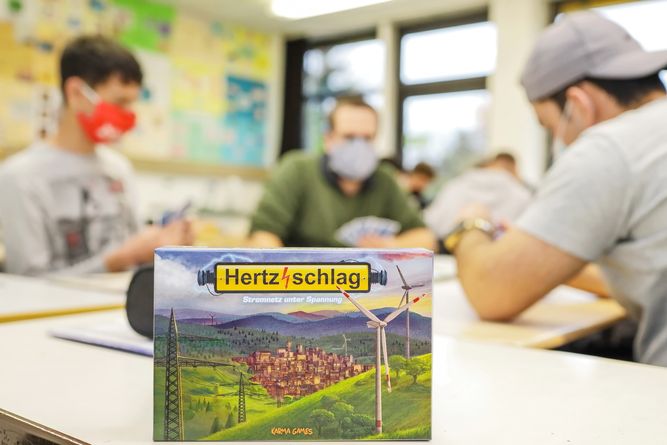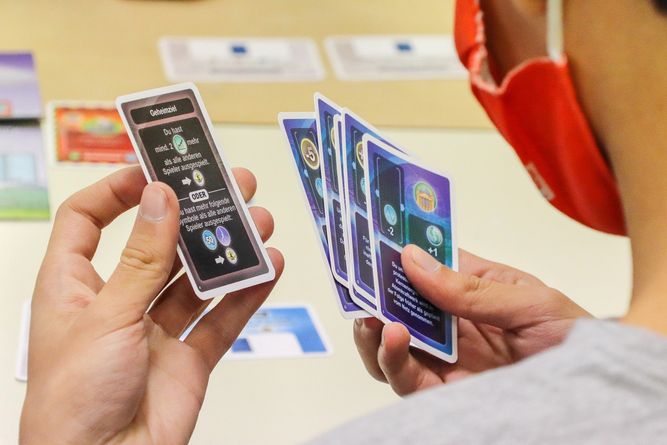'Hertzschlag' puts the electricity grid to the test
19.11.2020
A free game and teaching materials for Berlin schools to help with climate education
A free game and teaching materials for Berlin schools to help with climate education
Berlin school pupils can now get to grips with the energy transition in a fun and interactive way: as of this week, they have access to a new board game, 'Hertzschlag', developed in collaboration between pupils, teachers, Stromnetz Berlin and the games developer Karma Games. The aim of 'Hertzschlag' is to combine the need for information and transparency on the energy transition and conveying an understanding of the relationships within the energy system in a fun way. The game helps young live wires navigate the electricity network and comprehend concepts such as how the network is affected by renewable energy, their own behaviour, energy efficiency and political conditions. This combines climate education with an understanding of the technical and systemic challenges involved.
Three thousand games were produced in the first edition. Interested schools can now order the game and receive a class set – consisting of five games and additional teaching material to help teachers plan lessons. These include an informative brochure produced by Hagemann & Partner Bildungsmedien Verlag, as well as worksheets and access to online exercises. The game is aimed at children and young people aged 12 and above and is particularly suitable for use in physics and geography lessons for years 10 to 13.
Like in the electricity network, balance is key
Why an energy game? Stromnetz Berlin CEO Thomas Schäfer explains: "As the city's distribution system operator, a lot of our work is done 'underground' and is not well known to much of the general public. That's why we came up with the idea of developing a game to make the energy system – which can be difficult to grasp – clearer, more transparent and more visible. We hope pupils at Berlin schools will enjoy this interactive, innovative way to familiarise themselves with the electricity network and find the right balance as they manage the energy system."
Together with their teacher, Sebastian Jungwirth, pupils at Elinor-Ostrom-Schule in the Berlin district of Prenzlauer Berg helped develop the game concept at a workshop supported by project partner B.A.U.M Consult in January 2018. Jungwirth can now try out the game in the classroom at his current school, Clay-Schule in Neukölln. As he states: "Hertzschlag enables pupils to gain a good understanding of the energy transition in a genuinely fun way. Through playing, they can learn about the impact they themselves can have and how their actions affect the environment and the electricity network. The game offers a different approach to the topic than would usually be the case. I myself have even seen pupils with a phobia of physics showing an interest."
The game was created as part of WindNODE, the SINTEG programme for Germany's north-eastern states funded by the Federal Ministry for Economic Affairs. Numerous studies show that large swathes of the general public do not feel sufficiently well informed about the energy transition. This is where 'Hertzschlag' comes in. Electricity networks are a crucial link in the energy transition chain and play a key role in integrating new energy suppliers, such as those from the renewable energy sector, and new consumers emerging in areas such as e-mobility.
Key features of 'Hertzschlag'
- The game is designed to have a common goal for all players as well as ways for individual players to acquire points.
- The basic concept is that the game's energy system should always be in balance (50 hertz).
- If the system goes too far out of balance, everyone loses.
- Each of the players' individual actions have an impact on the frequency and therefore the balance. Events such as weather conditions and network failures can also throw the system out of balance.
- The more weather-dependent renewable energies that are in play, the stronger the impact of the weather conditions. Options allowing for flexibility become more significant.
- Controllable sources and consumers of energy help restore the balance.
- Each individual player's goal is to optimise the energy mix and efficiency. They all have their own 'secret goal'. This gives every individual player a way to win for themselves.
- Interaction with the player's neighbours add an extra dose of fun to the game. You can stick to the agreements… or not.


